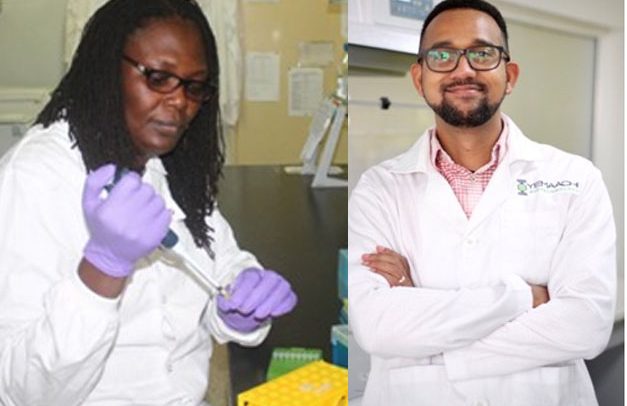Dr Yaw Bediako and Dr Anita Ghansah
Two Ghanaian scientists have been named among 14 African fellows for the maiden cohort of the Bill and Melinda Gates’ Calestous Juma Science Leadership Fellowship Programme.
The scientists, Dr. Anita Ghansah whose research is into Malaria Molecular Surveillance and Dr. Yaw Bediako whose research is into Immunology would each receive up to $1 million over five years to support the development of innovations needed to end the pandemic and address urgent global health priorities.
They join other scientists from Kenya, Nigeria, South Africa, Uganda, South Africa, Zimbabwe, Cameroon, and Mali, for the programme.
This was made known at the 2021 Grand Challenges annual meeting, by the Bill & Melinda Gates Foundation. A new $50 million initiative to build a resilient global health infrastructure in which scientific innovation reaches everyone was also announced.
The 10-year initiative will prioritize grants to scientists from low-and middle-income countries and support a balanced representation of women principal investigators. It is also designed to ensure scientists and institutions in low- and middle-income countries play a central role in shaping the global research development agenda and developing solutions that can better meet the needs of their communities.
Initial focus areas will include data science, such as mathematical modeling to inform national malaria control programs; digital health services for pregnant women; and innovations to close gaps identified by current programs for eliminating neglected tropical diseases.
“We need the ideas and leadership of the people who are closest to the global health challenges we are working to address,” said Mark Suzman, CEO of the Bill & Melinda Gates Foundation. “The Grand Challenges Global Call to Action represents our commitment to advance innovation and equity while strengthening local partners in a sustainable way.”
The foundation also launched the Global Immunology and Immune Sequencing for Epidemic Response (GIISER) program, which would ensure scientists have the capacity to rapidly detect if new SARS-CoV-2 variants in their communities show signs of evading immune response.
This will allow national and regional stakeholders to respond appropriately and develop products that meet the specific needs of their geographies.
GIISER will operate as a decentralized network of autonomous and geographically distinct hubs that are able to connect local pathogen sequencing data and clinical epidemiology with local immunological understanding and tools.
As part of this program, the foundation will provide $7 million over two years to investigative teams in eight countries (South Africa, Senegal, Nigeria, Ghana, Kenya, Uganda, Brazil, and India) to expand their existing immunological capacity.
By Jamila Akweley Okertchiri


